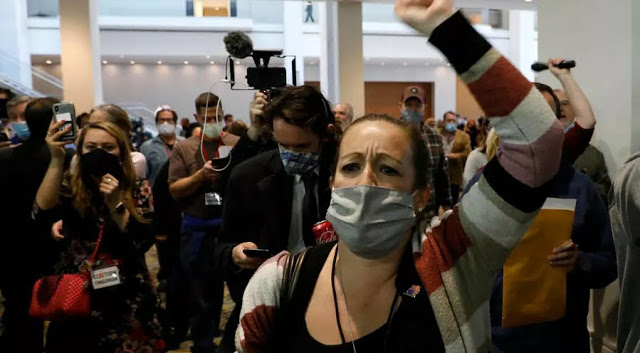All it took was a Facebook page and a hashtag: As election tallies trickled in Donald Trump supporters were busy going viral, accelerating the unsubstantiated claim that Democrats were “stealing” the election under the rallying cry #StopTheSteal.
It lived just 48 hours but the page quickly racked up 350,000 members, people subscribing to the conspiracy theory the Republican president too has been touting to his 88 million Twitter followers.
Trump’s social media “influencers” — his son Donald Trump Jr, or the spokesperson of the Republican party Elizabeth Harrington — also played key roles in spreading the falsehood.
And it wasn’t long before the hashtag, already popular with Republicans during the 2018 midterms, translated into concrete protests.
The “Stop the Steal” page called for demonstrations in states including Georgia, Nevada and Pennsylvania where votes were still being counted and the races were neck-and-neck.
The calls to action sometimes came with allusions aiming to sow violence including slogans like #civilwar — prompting Joe Biden supporters to sound the alarm, demanding Facebook shut down the page.
By Thursday midday, the hub for misinformation was no more.
“In line with the exceptional measures that we are taking during this period of heightened tension, we have removed the Group ‘Stop the Steal,’ which was creating real-world events,” Facebook said in response to an AFP inquiry.
“The group was organized around the delegitimization of the election process, and we saw worrying calls for violence from some members of the group.”
But the seeds were planted — and its adherents quickly began denouncing the removal of the page launched by the pro-Trump group “Women for America First” as “censorship.”
“It’s what we call a media manipulation campaign,” said Emily Dreyfuss, of Harvard’s Media Research center.
“It’s this really memorable phrase that simplifies a super complex issue,” she said. “It sticks in the brain.”
– Conspiracies abound –
These campaigns aren’t grassroots, Dreyfuss said, but rather propagated from the upper echelons of the Trump campaign.
As with another pro-Trump slogan — #BidenCrimeFamily — that spread an erroneous notion, the hashtag offers “a simple message framed with a specific agenda,” she said, a bite-sized way to mislead a nation.
The page’s closure by no means spells the end of the disinformation campaign — similar groups and hashtags are already springing up.
The slogan “Stop The Steal” is still plastered all over social media, and is also a battle cry at demonstrations or in video clips, images that end up elsewhere on social media, said Renee DiResta, a researcher at the Stanford Internet Observatory.
“We see the baton passing also on Twitter, making its way to Facebook and YouTube,” she said.
“This is presenting enforcement challenges for platforms,” which have been working harder to fight disinformation since 2016.
Other far-fetched conspiracies have also been making the rounds since the November 3 vote, including one dubbed #Sharpiegate that says the felt-tipped pins to fill in ballots could make choices illegible to voting machines.
Launched in a county in Arizona, the thesis quickly debunked by local officials quickly spread, resulting in a Wednesday evening protest in front of a local election office demanding a recount.
But facing disinformation, facts often carry little weight: Once they begin spreading, these falsehoods imprint on the minds of people suspicious of the process.
Such theories could easily continue propagating after the election, according to Alex Stamos, director of the Stanford Internet Observatory, in the same way as the far-right “QAnon” movement, which claims Trump is waging a secret war against a cabal of global elites who are Satan-worshipping pedophiles.
“It’s highly unlikely to us that this activity is going to slack, even after the inauguration,” Stamos said.
“This activity will continue and people will build upon these narratives.”
By AFP
In this article:
 |
| Donald Trump supporters protest in front of a ballot processing center in Michigan, claiming electoral fraud JEFF KOWALSKY AFP/File |
